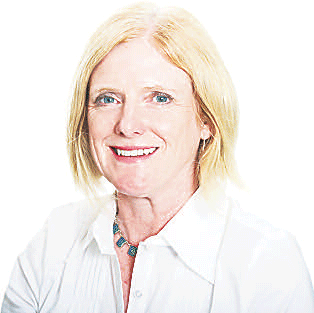Comment: "You can have cutting-edge techniques, but without nurses hospitals would not function"

Being a nurse is a great privilege. Nurses have always been able to help those who are sick or distressed, and giving care is rewarding in itself.
Recent years have seen huge technological advances in drugs, surgical procedures and ways of managing conditions - and people can expect to live longer than ever before.
This new decade will show that quality care is as important as these advances, and the great thing about being a nurse is you get to be a part of both. You work on cutting-edge developments, but you are also there to show compassion to patients and speak up for them. This is your role whether you are a nurse on the ward, a director of nursing for a hospital or managing long-term conditions in the community.
Nurses can take patients through their treatment from start to finish, and they can reduce patients' suffering as well as their need for treatment. Last year, the Prime Minister set up a Commission to examine the future of nursing and midwifery in England, showing the importance of nursing to the health system of the future. The Commission's report makes it very clear that nurses should be ambitious about what we can achieve as a profession, so the scope of nurses is wider than ever.
Nursing roles are constantly evolving. Nurses in both the public and private sector have an increasing amount of autonomy, and often lead multi-disciplinary teams, delivering care and making decisions.
It is a profession that attracts a diverse range of people with a variety of experiences. There are nurses today who have come from every conceivable profession, from coal miners to bankers, and they bring with them a wealth of experience, which makes nursing a rich and rewarding, and above all human career.
It is also a career that can take you around the world - and many nurses use their skills to good effect, for example, in war zones.
And what they do when they join the profession varies hugely too. The staff nurse on the ward is still the linchpin of hospital care. You can have advanced technology and surgical techniques, but without nurses to manage wards and deliver care, hospitals would not function. Similarly, mental health nurses offer high quality care that patients could not do without, for example caring for people with eating disorders or drug addiction.
Specialist nurses, who look after patients with all kinds of complex conditions such as cancer, diabetes, Parkinson's, multiple sclerosis and dementia, make an unparalleled contribution to the lives of patients. Often these nurses are with patients from the moment they are diagnosed, throughout the course of their treatment, and they can offer support, clinical expertise, time and commitment that no other profession can.
These specialists are truly appreciated by patients. Carolyn Noble is a Parkinson's specialist nurse, and helps her patients to stay at home, supporting the family as well as the patient. Lillian, whose husband Tim is Carolyn's patient, says: "Carolyn is a star and I mean it. I wouldn't know what we would do without her."
A revolution in health care is unfolding across the UK, with all kinds of services moving to deliver more care in the community, closer to home and in many cases at home. This way, patients can access high quality care where they are more comfortable and are given time to deal with the emotional effects of their illness. Nurses will not just play a key role in this, they will lead from the front to make it happen and make it work.
The recent move to make nursing an all-graduate profession in England from 2013 is a clear indication of the levels of skill in nursing that we aspire to. But this is not a move designed to keep nurses in lecture theatres. It is a necessary step to prepare nurses to meet the demands of the future, which requires them to have extensive experience of delivering care in a range of settings. Nor is it designed to narrow the entry gates for nursing - we want nurses who are committed, and when they are, they should be able to get a full preparation for all parts of their role.
So this is an exciting time to be a nurse. Behind the headlines, nursing is more than just a job, it is a way of making a difference to patients and families, being creative in delivering care and innovating to give patients what they need.
Nurses of the future will be leading from the front, and we need to recruit the best and the brightest to make the care patients want a reality.
Join our commenting forum
Join thought-provoking conversations, follow other Independent readers and see their replies
Comments
Bookmark popover
Removed from bookmarks